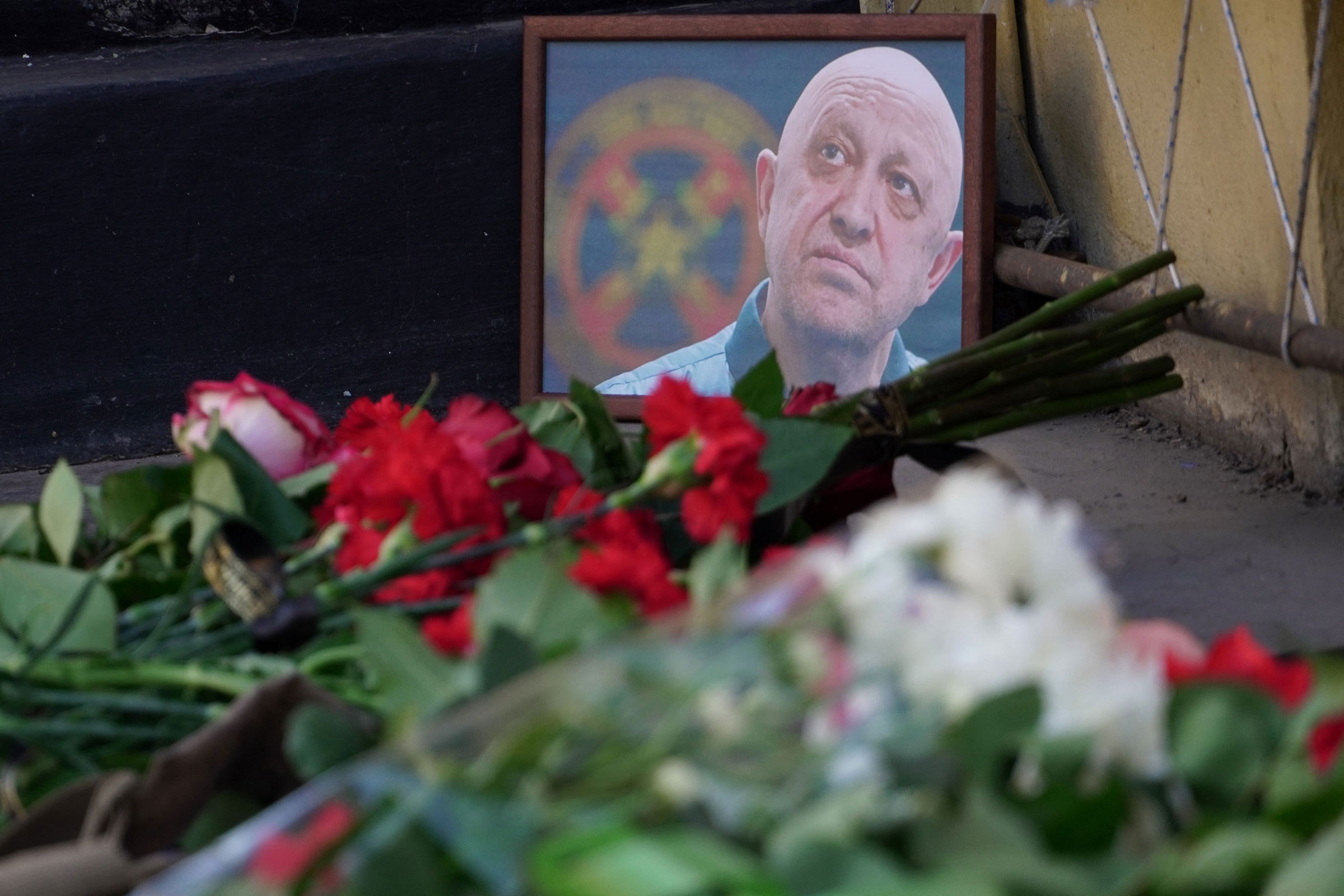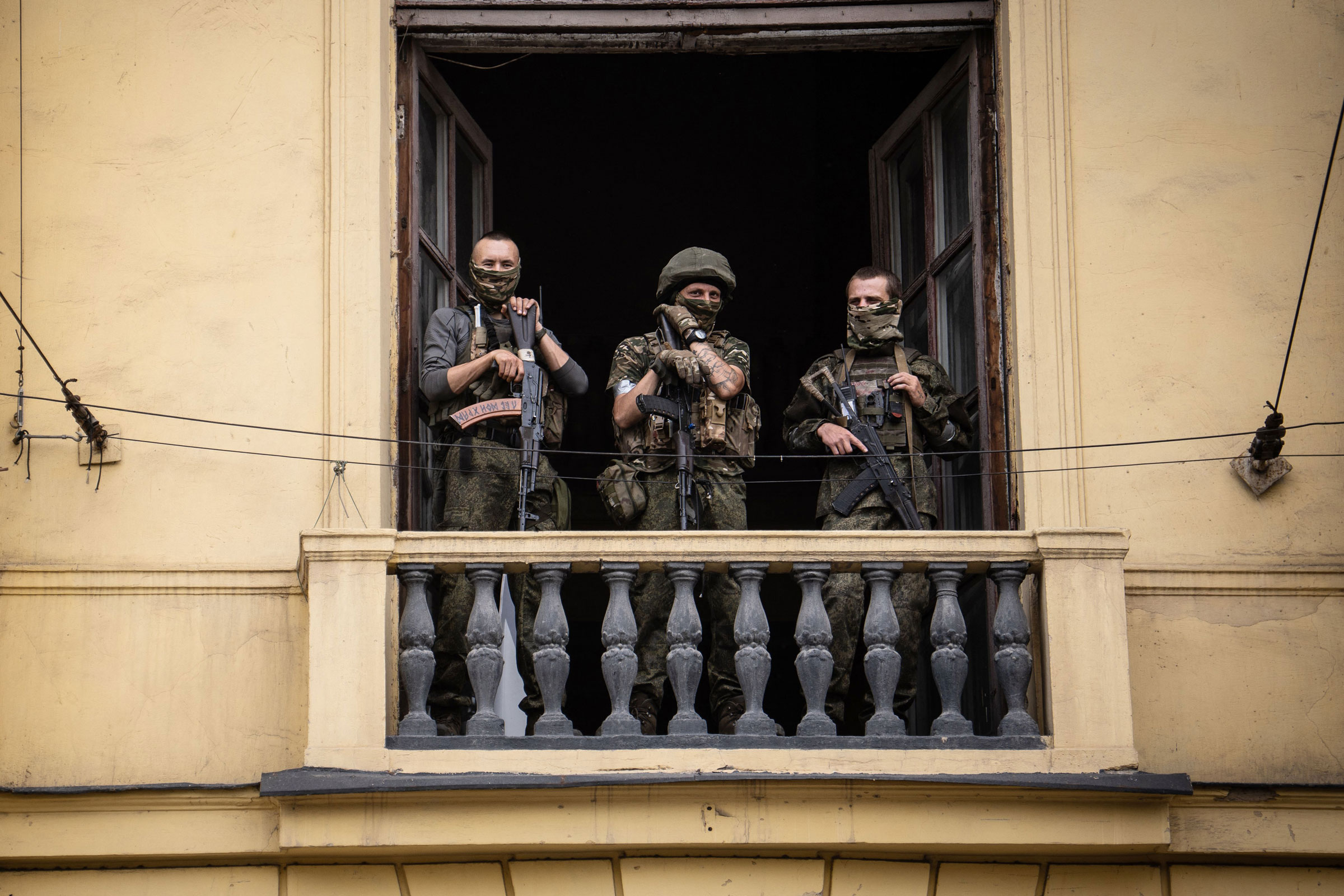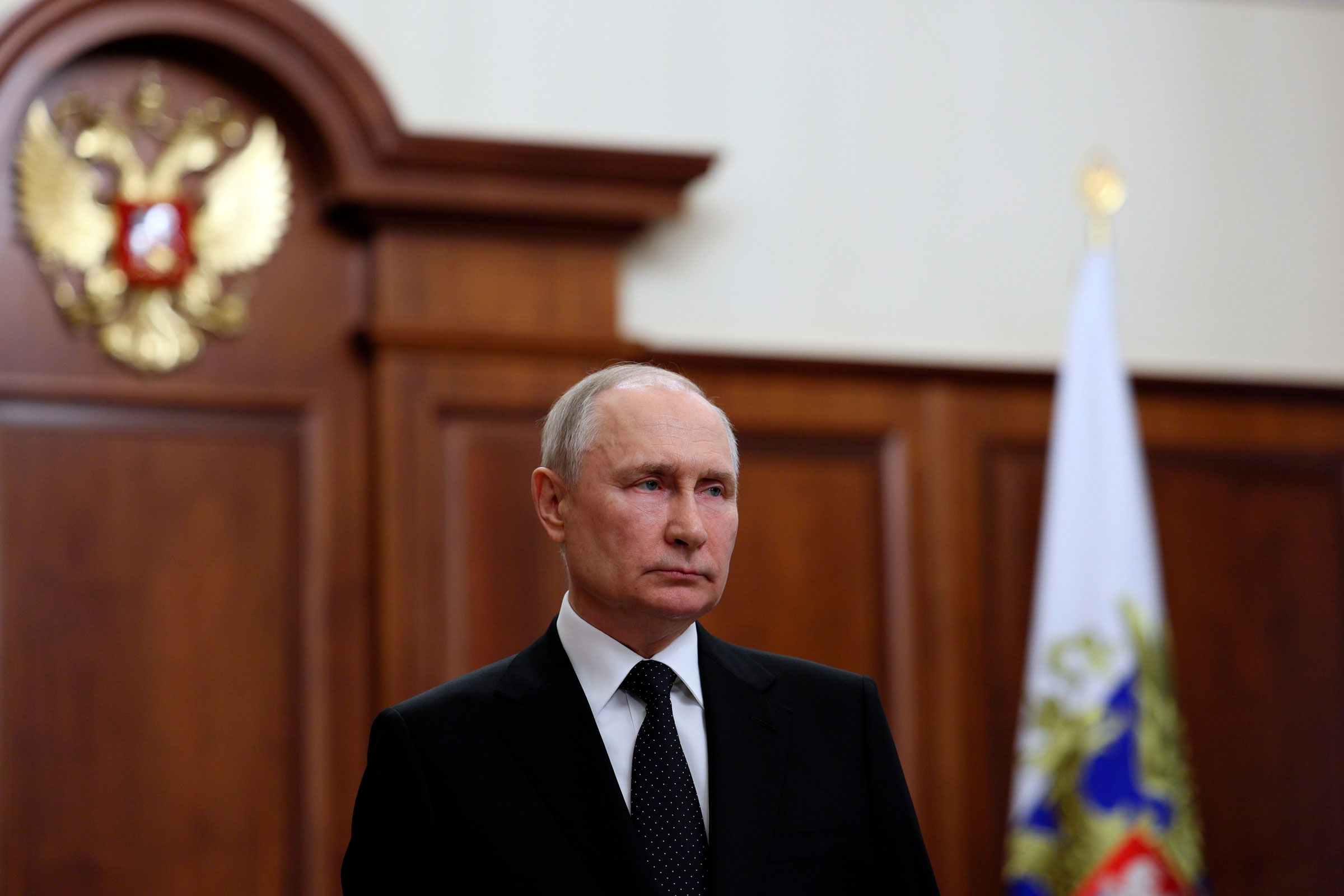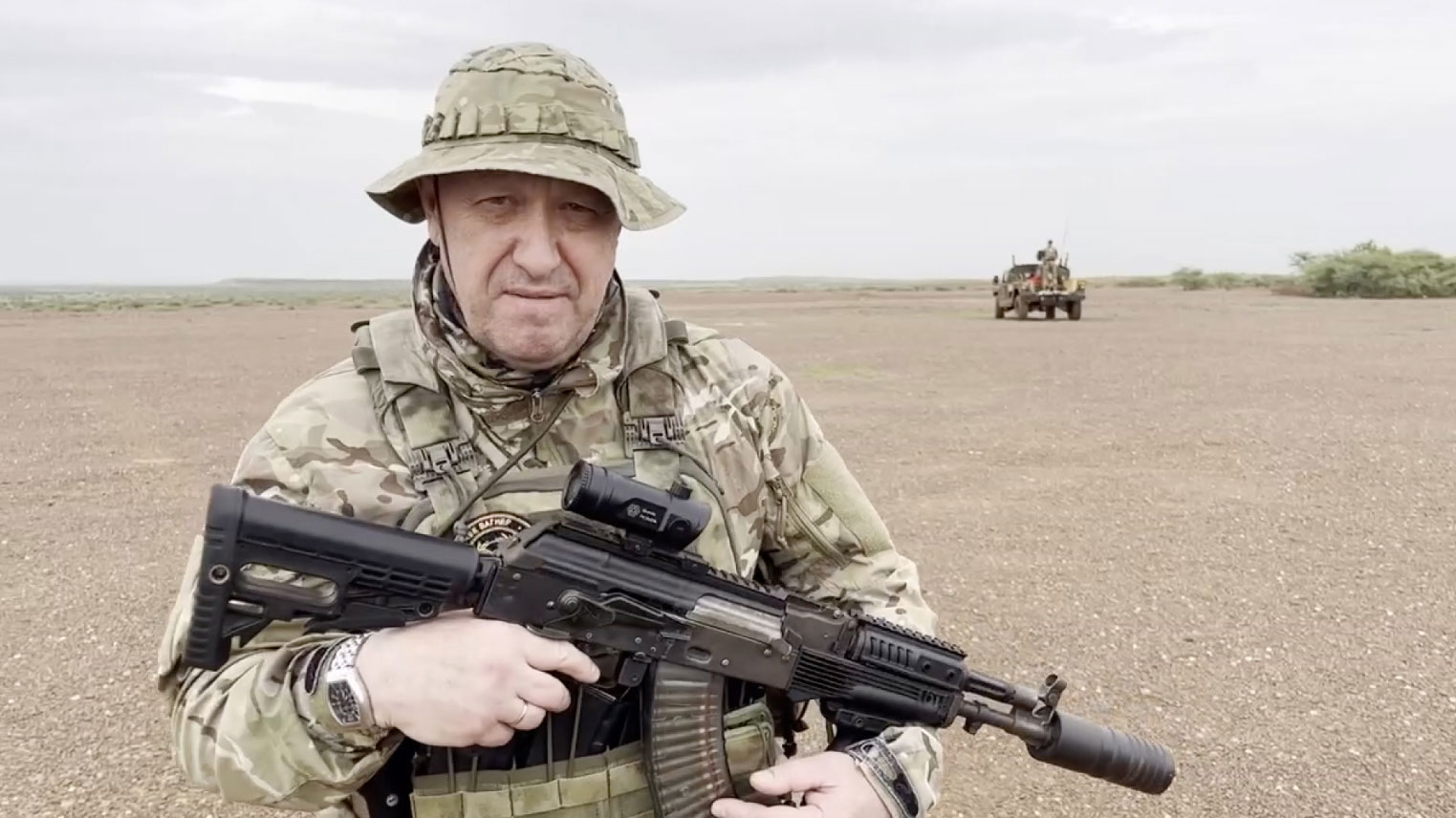
The predictability of brazenly atrocious and baroque violence in Russian court politics does not make it less shocking when it actually happens. And this week it has happened in all senses with a fiery vengeance.
“Are you able to forgive?” an interviewer asked President Vladimir Putin in March 2018. “Yes, but not everything,” he replied.
“What is it impossible to forgive?”
“Betrayal,” replied Putin, speaking as a Russian spy who had worked for the British, Sergei Skripal, lay apparently dying after being poisoned in Salisbury, England by Russian assassins.
More From TIME
This week, it seems it was the turn Yevgeny Prigozhin, the billionaire oligarch, catering tycoon, mercenary chieftain, and recent mutineer, when his private jet was either blown up by a bomb or was shot down. He is presumed to have been killed. Prigozhin was the head of the Wagner mercenary force and its commander Dmitry Utkin and other Wagernians (nicknamed the Musicians on military Telegram accounts) were also aboard the plane. As was a young and completely innocent air hostess named Kristina Raspopova—another victim of careless Russian potentates.
But as usual in today’s Russia, we know very little about what is really happening within the tiny inner circle of the Putin court. It is clear that so far even supposed "security experts" are just reading the same Telegram accounts as the rest of us. We have not seen Prigozhin’s body and his death cannot be confirmed but both the Russian state and Wagner sources say he is dead—so he most probably is no longer amongst the living.
Given the rules of power in Putinist Russia, no one is surprised that Prigozhin was killed, only that the interval between his mutiny and his killing was so long—two months—and so tortuously inconsistent that it exposed the weakness of Putin. Russian rulers are experts in targeted violence that can be both entirely predictable but kinetically surprising.
The rise and fall of Prigozhin reveals many threads that run throughout Russian history and remain acutely relevant now. It also chronicles the depletion of autocratic prestige, state power, and competent management, and it further raises the threat of the disintegration of Russia itself.
First, all of this is a symptom of personal power, one man rule, the habitual system of autocracy in Russia throughout its long history. One cannot say dictatorship is the only way Russia could have developed and that democracy is impossible; far from it, but its tendency is overwhelming. Putin has shaped a modern version of autocracy, held together by his personal power, ability to play off his potentates, and offer glory and stability to his people. His decision to "roll the iron dice"—Bismarck’s great expression—of war has not only led to the death of an estimated 500,000 people, many of them innocent Ukrainian civilians, but also placed his own rule under impossible stress, revealing a decaying state dominated by coercion, feuding, incompetence, mendacity, and venality.
Yet it turned out Putin was inept at running his own court and could not prevent Kremlin rivalries playing out online and then exploding into open rebellion on 23 June 2023 when Prigozhin led his forces to seize Rostov and then advance on Moscow. We may never know the real deal brokered by Putin’s client Belarusian dictator Alexander Lukashenko to stop the advance, but Putin, ashen and lacking his trademark swagger, was forced to go on TV to denounce Prigozhin’s treason. Russian rulers are accustomed to face rebellions and crush them but they generally did so with considerably more elan—and more vivid violence. Peter the Great rushed back from his Great Embassy to Europe to torture thousands of rebel musketeers in specially-constructed torture chambers. Catherine the Great unleashed her generals to crush the Pugachev rebellion—they sailed floating gallows down the Volga. Nicholas I facing the mutiny of elite Guards regiments in the streets of Petersburg bombarded them with artillery. Putin acquiesced in Lukashenko’s shadowy agreement and even met Prigozhin who was allowed to fly around the world, recently visiting his Musicians in Africa, wielding a Kalashnikov and full desert fatigues.

The rise of Prigozhin (‘Putin’s chef’, ‘hotdog-seller’) is not some exotic freak of nature: he is just the latest in a long line of court favourites whose ascendancies are the inevitable result of personal power at its most supreme. Some imperial favourites were amazingly talented—Catherine the Great’s co-ruler Prince Potemkin was the greatest statesman of the Romanov dynasty—and some not—Nicholas II’s Rasputin was the most talentless. But when these favourites lose the protection of their patron, their falls are vertiginous for their power and wealth arouse vicious jealousy amongst the traditional elites. The great favourite of the last reign, Boris Berezovsky, a Jewish mathematician charmed the ursine, cantankerous, crapulous President Boris Yeltsin and vitally his influential daughter Tatiana, with his nervy worldly dynamic style, made billions from owning Sibneft and Aeroflot. Fatally he played some role in anointing Yeltsin’s successor, Putin, who swiftly resented Berezovsky’s presumptuous interference. Escaping into exile, his death reportedly by hanging in the bathroom of his Surrey mansion may have been either a howl of despair or an efficient mission by Putin’s assassins. (The British police have been cloddishly slow to realize that Russian agents were using all methods, including efficient poisons, to kill victims in Britain.)
Prigozhin, one of Putin’s St Peterburg circle, received massive financial prizes: catering and later military contracts worth billions. But he was also one of more energetic and competent managers that Putin trusted: it was he who set up the troll-farms Putin used to undermined the democracy of the Chief Enemy (America) and it was he who helped create the Wagner mercenary group that allowed Russia to run a cost effective and aggressive but deniable foreign policy. Who can forget the amazing sight of Russian mercenaries fighting their way across the Syrian desert to take the ancient city of Palmyra, once in ancient times the capital of Empress Zenobia and her Middle Eastern empire? When Putin launched his wars against Ukraine, initially in 2014, then fullscale in 2022, and the military turned out to be ill-led and ill-supplied, Prigozhin provided his vicious Wagner stormtroopers who distinguished themselves with their resilience and atrocities. Emulating Stalin’s use of convict conscripts in his Shtrafbats in WWII, he recruited in prisons. He had deserters executed with sledgehammers, glorying in violence justified by nationalism. That was where Prigozhin intensified his feud with Putin’s long serving magnates Defense Minister Shoigu and Chief of Staff Gerasimov. Putin’s failure to control that feud has exposed his own limits.
Prigozhin became the condottiere of his own private army, funded by the state. He was not the only one: the Chechen ruler Ramzan Kadyrov is also effectively a warlord with his own private forces. It is a sign of Russia’s weakening state that Putin allowed non-state players to command their own armies in the first place.
Read More: What Comes After Putin's Rule in Russia
Prigozhin’s criminal background—he served time in prison and seems to have killed someone in his youth—was another feature of the Russian power culture. It was the Bolsheviks who merged criminal culture with that of the state. The revolutionary Sergei Nechayev had declared in his 1869 Revolutionary Catechism that “We must unite with the world of adventurous gangs of criminals, the only genuine revolutionists in Russia”—an idea that influenced Lenin, Stalin, and their generation.
Once in power, they endowed their new secret police the Chekas with powers of arbitrary violence unthinkable in the era of the tsars. The Romanovs under Nicholas I had invented modern secret police organs but for all their violent suppression of rebellions, they rarely assassinated enemies or traitors outside or inside Russia. Lenin and Stalin disdained their softness: the end always justified the means. Before power Stalin raised cash in spectacular bank robberies and protection rackets while liquidating traitors. In power, their Cheka harnessed the esprit of a military-religious order of knights with the atrocious violence of a gangster hit squad. Even as Cheka developed into a vast bureaucracy of the NKVD and later the KGB, it became the elite corps of Soviet state. When the Soviet Union collapsed, KGB officers, now working for the new organs the FSB and the SVR, regarded themselves as knights—what their director, and now one of Putin’s top henchmen, Nikolai Patrushev, called a new nobility but it was a nobility that encompassed the corruption, greed and murderousness of a Mafia family.
President Putin himself revelled in that culture—his swaggering threat to liquidate Chechen terrorists “even sitting on the lav” was a deliberate statement of that murderous machismo. In the secret police and intelligence organs, there is a special prestige to assassinations which are known vividly as мокроедело, mokroye delo (Wet Work).
The mechanism whereby Putin orders killings—and to what extent they are signed off on paper or by secret verbal orders and to what extent they are perpetrated by courtiers seeking to win favour— is unknown of course. Sometimes Putin is likely to be involved in planning such operations; other times not. We do not know. Sometimes the killers may be Chechens maybe organized by Putin’s other feral favourite, his tributary ruler of Russia’s Chechen republic, Kadyrov. Sometimes the killers are FSB or GRU spies; other times gangster hitmen on semi-official business.
In the case of Prigozhin—if indeed he is dead and if this was the work of a missile it would have required coordination between FSN or the military intelligence GU to ensure that the right people were on the private jet and the Air Defence, not an organization frequently used for Wet Work, to bring it down. A bomb is simpler.

Russian rulers must always exist in a state of ferocious vigilance. The direction of secret police organs is almost their first duty and perennial interest. But also espionage is thrilling for leaders— it is one of the exciting parts of the job for any leader, even in democracies. Stalin personally ran the organs himself, directing everything through henchmen, most famously two NKVD commissars, Nikolai Yezhov, who was untalented, unstable and always out of his depth, and Lavrenti Beria, his fellow Georgian who was highly capable, efficient and sadistic—and almost managed to succeed Stalin as Soviet leader. But Stalin’s NKVD potentates were much more important than Prigozhin— they managed vast organs and many millions of people.
Stalin believed killing was an invaluable political tool—boasting to his Bulgarian ally Georgi Dmitrov—“we do it by bloodletting”—but he was also fascinated by Wet Work, enjoying the devising the complex murder plots such as the killing in a "car accident" of the beloved Yiddish Soviet actor Solomon Mikhoels who was actually kidnapped, given a fatal injection and then placed n the street to look like the victim of a car crash.
The violence that Prigozhin flaunted was very much a part of Putinist culture as it was in Stalin’s time: Putin has never approached the scale of repression that Stalin unleashed during collectivisation, his famines and then his Terror. The death toll runs into untold millions—it will never be exactly known. It is a different time now and Putin is not Stalin in many ways. But targetted killing has always been part of his system: his accession saw a spiral of killings of his enemies or inconveniences to his power, from that of Galina Starovoitnova, the Duma member who promoted western democracy when he was still FBS director, to Anna Politovskaya, the investigative journalist, in 2006 and ex-deputy-premier and critic Boris Nemtsov in 2015, and famously the poisoning of his chief opposition Alexei Navalny in 2020. While abroad dissidents and double-agents from Alexander Litvinenko to Sergei Skripal were targeted for murder with exotic poisons from the biological weapons laboratory.
Since the Ukraine war started, destabilizing and reshaping the secretive tournament of rivals and clans into a frenzied cagefight for money and power, the killing spiral has become unpredictable and widespread: bankers, oil executives, bureaucrats—and sometimes as a gruesome warning, their mistresses—have been murdered—thrown out of windows, drowned in pools, poisoned. Many businessman who expressed skepticism about Putin’s war now found that their rivals—who many well have been FSB potentates—could forcefully grab their companies and sometimes liquidate them, too.
Putin proudly declared in 2018 that betrayal of the secret services was unforgivable and however long it takes, the state and the Organs will take vengeance. Putin and his Chekist potentates adopted the old Stalinist rule that any traitor must be hunted down and killed. The secret police always followed this rule, even spreading the rumour that the '60s double agent GRU Colonel Oleg Pentkovsky was executed by being incinerated alive at a secret police crematorium in a ceremony attended by selected officers. It may even be true.
Every autocrat identifies totally with the state and its servants: Putin does not need to choose between state and personal betrayal. But treason is even more bitter if the traitor is a personal friend and protégé like Prigozhin. Peter the Great was outraged by the betrayal of his close long-serving ally Ivan Mazeppa, the Ukrainian Cossack Hetman of Zaporizhian Host and Left-Bank Ukraine for twenty years. His story is very relevant today. Mazeppa feared that Peter was about to grant the Hetmanate to his intimate Russian friend Prince Menshikov so when the Swedish King Charles XII invaded Ukraine in 1708, Mazeppa agonized what to do. Charles offered him independence. Mazeppa defected to the Swedes. Peter was incensed and sent Menshikov to liquidate everyone in Mazeppa’s capital. He was keen to kill Mazeppa too but the Hetman died of natural causes soon after he and Charles lost the battle of Poltava in 1709.
Even more personal was the betrayal of Peter by his own eldest son who plotted against him and then defected, escaping to Vienna in 1716. Peter lured him back promising security—but on his return he tortured him to death. Peter is Putin’s hero. Photographs of his sumptuous yacht were revealed by opposition researchers online and even there he had a statuette of the first emperor of Russia. No matter how close the traitor, the traitor had to die.
Prigozhin was an intimate courtier of Putin and it seems that Putin continued to protect Prigozhin even when he was ranting in his baritone roar against Shoigu and Gerasimov as they played political games, starving his Wagnerians of ammunition and support. But sometime in the meatgrinder of Bakhmut, the desperate fray turned his head: Prigozhin started to identify himself and his Wagner troopers as blood-spattered heroes of Russia’s war against Ukraine —and anyone who held them back as traitors to the Motherland—even Shoigu, maybe even the President himself. Some of the Russian Army’s best fighting generals—General Armageddon Surovikin the most prominent—sympathized with Prigozhin and despised the cowards at headquarters.
The rebellion of June 23 this year crossed every line. It was a humiliation for the President. Not just the personal betrayal of Putin’s protégé on whom he and the state had showered billions but also a political betrayal that exposed to the world the incompetence and corruption of Putin’s command and conduct of the war. Putin spoke of Prigozhin with almost paternal sadness like a son he had had to sacrifice: "I have known Prigozhin from the beginning of the 1990s," Putin said with a strange wistfulness. "He was a man with a complex fate. Sometimes he made mistakes; sometimes he got results--for himself and in response to my requests, for a common cause. He was a talented person.”
No one believed Prigozhin would remain amongst the living for long. Putin could not punish Prigozhin until the Wagner group was pacified and until he had identified, arrested, and dismissed any sympathetic generals. It seems Surovikin was arrested and sacked as commander of air defence the day before Prigozhin flew too close to the sun.
Then Putin received Prigozhin at a meeting of Wagner commanders. That must have taken some of his arctic self control. He allowed Prigozhin to appear on the sidelines of his conference with African leaders, many of whom would have known the condottiere since Wagner troops were present in their countries. A week ago, Prigozhin was reportedly in Africa, probably Mali boasting that Wagner was “making Russia even greater on all continents, and Africa even more free.” He growled that “the temperature is plus 50 degrees Celsius” in Mali but he did not realize it was getting even hotter at home...

It is said that the FSB had urged Putin to let him liquidate Prigozhin at once; Putin was more cautious. There were loose ends to tie up. But also there was something else there: he was teasing the loudmouthed braggart Prigozhin, letting him feel safe and preen on his online channels, even flaunt that he was still alive, still in business. Stalin did the same with his enemies such Nikolai Bukharin who reflected sadly that Stalin was a “master of dosage.” Putin too is a master of dosage.
It seems that Putin has deliberately beheaded the snake that is Wagner. Presumably its troops will be broken up or signed up by more reliable mercenary outfits. It is unknown who will take over Wagner’s role as Russia’s African vanguard.
In Russia, the mystique of power—from Peter the Great to Lavrenti Beria and on to Putin today—is often won by the capricious deployment of violence: now with this killing, Putin has to some extent restored his mastery. If Prigozhin was indeed on the plane this was an execution plain and simple. It was not just a bullet in the head but a spectacular strike. It was a state hit—Wet Work gone large. Yet this turbulence in the inner circle, the rise of warlords, the open feuding, the killings, the rebellion by a protégé, now the execution of a courtier by his master—all of this augers ill for Russia and presages the deterioration of the Russian state. Perhaps even a new Smuta—the Time of Troubles that almost destroyed Russia in the civil wars of 1598-1613 and again in 1918-21.
One man one problem, no man no problem—as Stalin and his henchmen put it. Есть человек — есть проблема, нет человека—нет проблемы. Except in this case many problems remain. The war for a start. Wagnerites may seek their own vengeance: what if they have admirers in say Putin’s bodyguards? And amongst his exploits Prigozhin has broken Putin’s myth of invulnerability and the taboo against elite revolt. Ultimately if the tsar stumbles it will be those closest who wield the dagger.
Here the president and officials of a huge empire and powerful nuclear-armed intergalactic modern state conspiring to liquidate one of their own intimates, behaving like narco-trafficantes or the cutthroats of a small town in Renaissance Italy. Yet So far Russia ‘s grandees and people are rallying to the Motherland and its ruler; its huge army is holding.
Putin is the master again of violence but he is damaged. Yet a weakened tyrant can rule for a long time. And war grinds on…
Simon Sebag Montefiore is the author most recently of The World: A Family History of Humanity and earlier of The Romanovs and Stalin: Court of the Red Tsar
More Must-Reads From TIME
- The 100 Most Influential People of 2024
- Coco Gauff Is Playing for Herself Now
- Scenes From Pro-Palestinian Encampments Across U.S. Universities
- 6 Compliments That Land Every Time
- If You're Dating Right Now , You're Brave: Column
- The AI That Could Heal a Divided Internet
- Fallout Is a Brilliant Model for the Future of Video Game Adaptations
- Want Weekly Recs on What to Watch, Read, and More? Sign Up for Worth Your Time
Contact us at letters@time.com